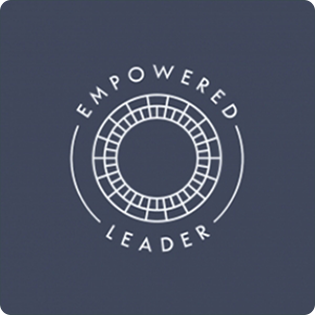The universal trait most successful and inspiring leaders across all industries and sectors have is a strong sense of self-awareness. The insights and understanding of their personality and its impact and influence on their leadership style as well as those around them, is what sets them apart.
According to Cam Caldwell PhD from the University of Illinois, ‘self-aware leaders have made a conscious investment in appreciating their values and drivers as well as what does and doesn’t make them tick’. This sustained effort on their part takes courage and vulnerability as well as their own willingness to accept their reality and their role in its creation.
Self-awareness is one of the 4 core pillars of Emotional Intelligence (EI), a term widely popularised by internationally renowned psychologist Daniel Goleman. At its essence, it’s a person’s ability to label and manage their own emotions while also influencing and managing the emotions of others.
Developing self-awareness is, in most cases, the first step in developing EI. Now widely recognised as a valuable and necessary skill for successful leadership.
Self-awareness requires us to be present and attuned to our own emotional landscape. Introspection and reflection are tactics most people will use to better understand themselves, their choices and their actions. This internal awareness is more about defining, owning and celebrating the best version of yourself and acknowledging the parts of yourself that you want to improve. It’s less about fixing self-perceived flaws and criticisms.
Developing situational awareness is an extension of this process spanning the emotional dynamics of the team and peers. This powerful tactic improves communication, collaboration and conflict resolution as it encourages empathy when engaging or responding.
A good place to start increasing your self-awareness is understanding your values, emotions and triggers.
Values
These are your personal code of conduct, providing clarity on what is important to you as well as guiding your decisions and choices.
It’s a worthwhile investment to take the time to either discover or reconnect with your values. They can shed light on areas in your life that are out of alignment or not clear to you.
Understanding what does and doesn’t make you tick builds stronger relationships with yourself and others while also boosting your confidence.
Emotions
Emotional triggers are a powerful insight into what is going on below the surface. Taking an inventory of what triggers cause your emotions to get ahead of you can be empowering and enlightening and in some cases confronting. Knowing your triggers allows you to proactively develop tactics that will return you to a state of calm enabling you to regulate your response.
Talents
Recognising your strengths and the positive impacts you have on the team and the organisation allows you to focus on those talents that come naturally to you that also serve others. Acknowledging where your talents do not lie encourages stronger collaboration with others whose strengths may be in areas where yours are not. This builds the right conditions for team cohesion and improves productivity, communication and trust.
Self-awareness has a positive impact on the organisation. Teams that are led by self-aware leaders experience less conflict, are high performing and contribute significantly to business goals and targets.
The clarity and confidence experienced by leaders with a strong foundation in EI comes from deeply knowing, understanding and accepting themselves. This in turn gives others within their teams, the insight and encouragement to follow a similar course and empower themselves to make a positive impact not only on their own life goals but also across the organisations where the work.
5 sure-fire ways to increase your self-awareness and lead more effectively
By now you’ve realised that self-awareness is a skill that you can grow and improve on both personally and professionally. When you are tuned into your actions and behaviours in different environments and situations – we better understand ourselves and what we need from others.
Take responsibility. There is no need for perfection, so stop striving for it. A perfectionist culture is toxic and a zero-sum-game. Instead, work towards reflection and responsibility. Reflect on your actions, behaviours, choices and decisions, whether they are good or bad and take responsibility for them. Doing this makes you more relatable and builds a culture of transparency, trust and productivity.
Ask for feedback. A healthy and strong work culture is based on constructive and compassionate feedback. If you’ve recognised a behaviour that doesn’t serve you or your team, ask trusted friends and colleagues to discreetly give you feedback or remind you when you ‘accidently’ repeat it. If someone in your team has asked to do more or less of something, ask them to gently remind you when you slip. Create a safe space for yourself and the people around you to share feedback discreetly.
Turn your feedback into action. When you receive feedback, document it and work towards making positive changes toward implementing it. You could remind yourself with post-it-notes, calendar alerts and journaling.
Begin a practice of Mindfulness. Yes, the M word – Mindfulness. It’s a game changer for effective leadership. Slowing down will actually help you to maintain sustained high performance without the burn-out. Some of my own favourite rituals and practices include:
- Breathwork – I do this for 15 minutes every morning when I wake up.
- Journalling – I take public transport most days so I’ve got the bandwidth to sit quietly (often with headphones in playing music) and journal. I incorporate gratitude journaling into my process.
- Cold showers – they sound horrific but they are very grounding especially at the end of a long day when I’ve been pulled from pillar to post. Start with 2-3 seconds at the end of a hot shower and build up over time to a few minutes.
- Meditation – this is something that I don’t practice as regularly as I would like (we all have these don’t we?) when I do practice it, I notice a shift in my mindset and tolerance levels.
Learn something new. Nothing will show you (and others) more about yourself than pretty much anything else. Consider it a fast track to self-knowledge. It’s an effective way to not only get out of your comfort zone, it’s also an opportunity to learn a new skill to support yourself personally or professionally in the future. Learning something new requires a level of vulnerability to realise and appreciate that you’re not always the expert, you won’t always have the answers or the necessary experience – and that is OK. I recommend documenting your journey and taking special note of when feelings of vulnerability come up and how you choose to manage them in the moment.
Liz Ellis is a leadership coach and specialist in strategic communications and engagement within the water sector. Her coaching practice, Empowered Leader, focuses on developing the skills and capabilities in leaders to embrace their personal power to improve their ability to influence better outcomes, communicate with clarity and lead with purpose and confidence.
BOOK YOUR FREE STRATEGY SESSION
Nothing changes until you do.
Book your free 30 minute consultation today and discover how a tailored coaching strategy can help you.

